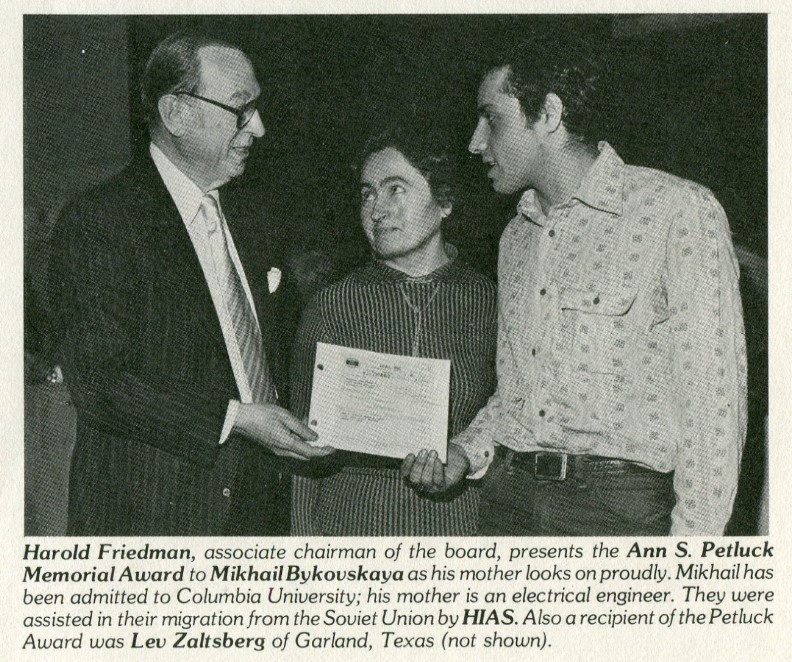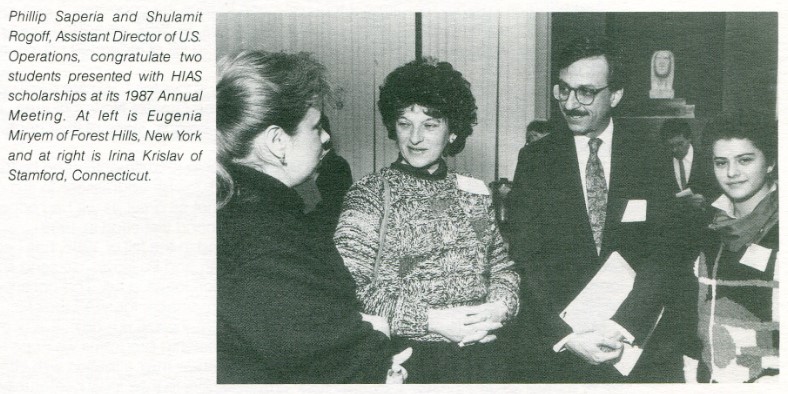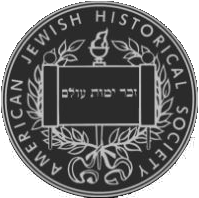The HIAS Scholarship Program, first begun in 1974, awarded immigrants or their children who “were making or preparing to make through study significant contributions to social betterment.”
In 1974, United HIAS Service (as the agency was then known) announced the establishment of the Richard Alan Shapiro Memorial Awards. The $250 awards would be presented annually to two individuals – immigrants or their children – who “were making or preparing to make through study significant contributions to social betterment.” The awards, presented at the HIAS annual meeting in 1975, were the first in what would come to be known as the HIAS Scholarship Program.
Richard Alan Shapiro, son of then Associate Secretary (and future HIAS President) Edwin Shapiro and his wife Claire, was fatally injured in a car accident on January 31, 1974 at the age of 23, when he was in medical school. HIAS Director Gaynor Jacobson and President Carl Glick suggested to the Shapiros that they create a fund in memory of their son.

Records of the Scholarship Program are included in the HIAS archives collection under the Development series. Documents such as meeting minutes of the Scholarship Committee, correspondence with judges, press releases, and newspaper clippings give an idea of the the evolution of the program from the 1970s to the early 2000s. The number of awards increased from one to hundreds as HIAS actively pursued donors. Requirements for eligibility were adjusted as the program became more established. Some of these changes can be traced via the press releases:
- 1975: $250 awards for “immigrants…who were making or preparing to make through study significant contributions to social betterment.”
- 1983: $300 awards for “refugees who have made exceptional progress or shown outstanding promise in resettling in the United States.”
- 1984: $500 awards for “refugees who have come to this country and wish to enter into or advance in the professions of their choosing.”
- 1988: $500-2,000 awards for “HIAS-assisted refugees and their children who have arrived here since 1977.” Dr. Arline Bronzaft, Chairman of the Scholarship Awards Committee, noted that this was the first year that the funds were earmarked “specifically for students who are pursuing or plan to pursue, a post-secondary education.”
- 1991: $500-2,000 Israeli awards for “Israeli students who [were] immigrants from the Soviet Union or Ethiopia, who made aliyah during 1980 or after … Awarded on the basis of need and academic excellence.” (Records in this subseries show that HIAS awarded scholarships to Israeli olim as early as 1978, possibly earlier.)
- 1992: $500-2,000 awards for “HIAS-assisted refugees and their children who migrated to the United States after 1977. The awards are intended specifically for students who plan to pursue post-secondary education and must demonstrate at least one year’s attendance in an American high school or college.”
A few of the awards at a glance:
- The Ann S. Petluck Award – A social work administrator who specialized in immigration and refugee work, Petluck’s efforts profoundly influenced the practice of migration casework and helped reshape United States immigration law. She served as associate director of the United Service for New Americans until its merger with HIAS in 1954 and then as director of U.S. Operations for the merged organization until 1964, when she became deputy representative of the United Nations High Commissioner for Refugees. Established by Meyer Poses in 1977 in memory of his wife.
- The Murray I. Gurfein Memorial Fund – Established in 1980 by Eva Gurfein to honor her husband, the late Judge Gurfein, who served as President of HIAS from 1956-57 and from 1960-67. For more information on Gurfein, see these blog posts: Judge Murray I. Gurfein and Judge Murray Gurfein in “The Post.”
- The Harry Ginsberg Memorial Fund – Established in 1991 in memory of Harry Ginsberg, a longtime HIAS board member, by his children. Harry’s wife Sophie also devoted her time to the cause of the agency, serving in the Women’s Division for many years (the division’s Sophie Ginsberg Chapter is named for her).

Thank-you notes from scholarship recipients (excerpts):
From a pre-med student originally from Syria:
“It is not the first time that I or my family receive support from the HIAS. When we arrived in the USA, the HIAS department for new immigrants took care of our asylum application. They made sure that we have a work authorization and Social Security. When my parents moved to Israel, HIAS took upon themselves the responsibility to provide me with the proper legal documentation such as Social Security and political asylum. It is an endless chain of efforts and accomplishments by the HIAS to provide each and every Jew with everything they need to live a decent life in the USA.”
From an NYC student from the former Soviet Union:
“Were it not for the one-thousand dollar scholarship I received from HIAS, I honestly may not have been able to go to college. It is important to understand that for recent immigrants, every little bit helps. I am most grateful for the opportunity HIAS has given me.”

